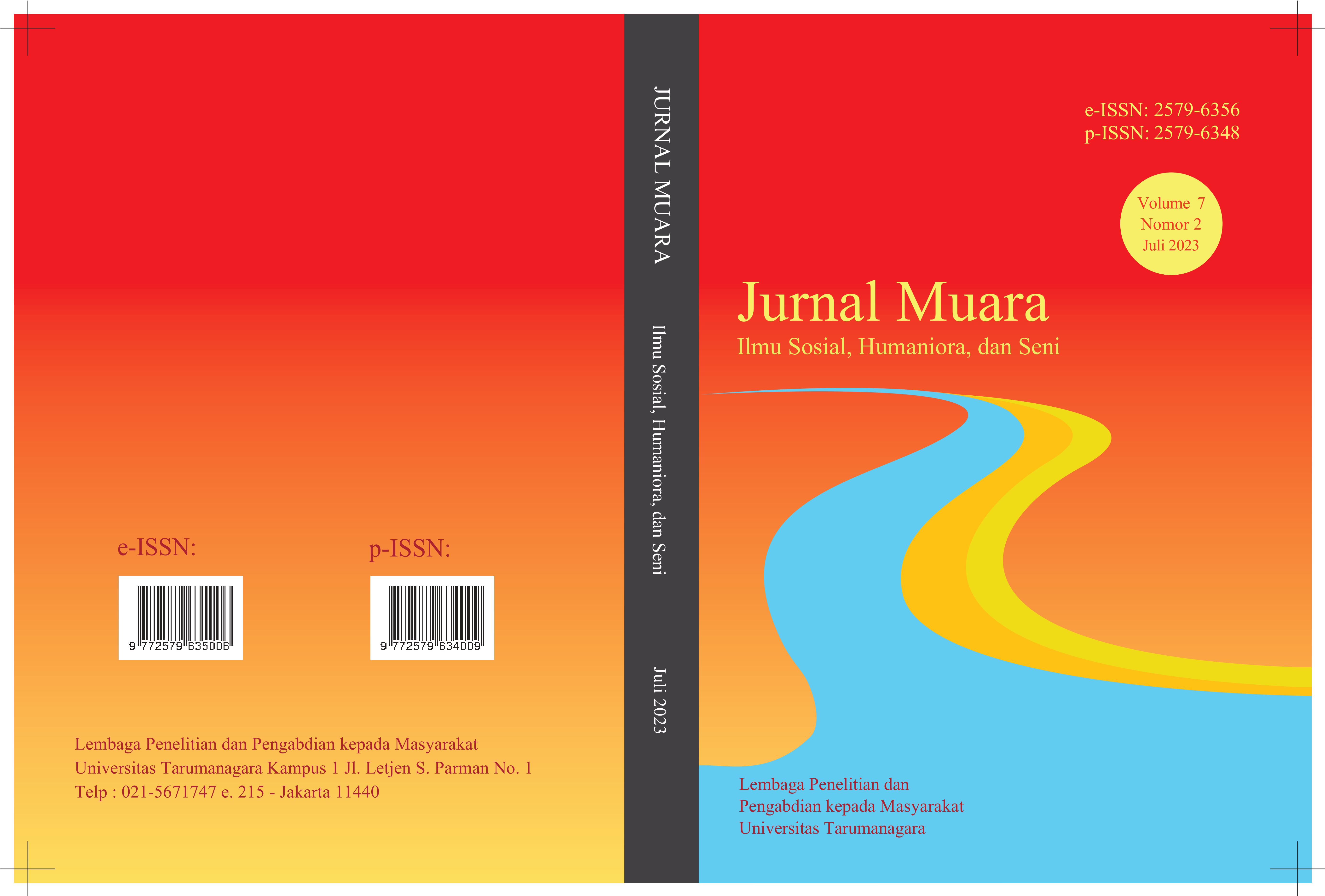HUBUNGAN ANTARA SELF ESTEEM DENGAN PROBLEMATIC INTERNET USE PADA EMERGING ADULTHOOD PENGGUNA MEDIA SOSIAL
Main Article Content
Abstract
Penelitian ini dilakukan bertujuan untuk mengetahui apakah terdapat hubungan antara self esteem dengan problematic internet use pada emerging adulthood pengguna media sosial. Penelitian ini juga dilakukan karena adanya peningkatan durasi waktu penggunaan internet terutama media sosial yang seringkali digunakan oleh individu untuk berinteraksi satu sama lain. Penggunaan internet yang berlebihan dan sulit dikontrol terjadi akibat adanya self esteem yang rendah pada diri individu. Pada penelitian ini, teori dan alat ukur yang digunakan adalah Rosenberg Self-Esteem Scale (RSES) dari Rosenberg (1965) dan Generalized Problematic Internet Use Scale 2 (GPIUS 2) dari Caplan (2010). Penelitian ini menggunakan metode kuantitatif dengan teknik non probability sampling yaitu convenience sampling dengan menyebarkan kuesioner secara online melalui google form. Partisipan dalam penelitian ini menghasilkan sebanyak 500 orang partisipan dengan rentang usia 18-25 tahun. Hasil penelitian ini menunjukkan bahwa terdapat hubungan yang negatif dan signifikan antara self esteem dengan problematic internet use pada emerging adulthood pengguna media sosial dengan nilai r = -0.566, p = 0.000 < 0.05. Hasil lainnya menunjukkan bahwa self esteem memiliki hubungan negatif dan signifikan dengan dimensi preference for online social interaction, mood regulation, cognitive preoccupation, compulsive internet use, dan negative outcomes pada variabel problematic internet use. Hal ini berarti semakin tinggi self esteem individu, maka semakin rendah problematic internet use.
Article Details
Section

This work is licensed under a Creative Commons Attribution-NonCommercial-ShareAlike 4.0 International License.
This work is licensed under a Jurnal Muara Ilmu Sosial, Humaniora, dan Seni Creative Commons Attribution-ShareAlike 4.0 International License.References
Arnett, J. J. (2015). Emerging adulthood: The winding road from the late teens through the twenties (2nd ed.). Oxford University Press.
Ayar, D., Gerçeker, G. O., Ozdemir, E. Z., & Bektas, M. (2018). The effect of problematic internet use, social appearance anxiety, and social media use on nursing students' nomophobia levels. CIN: Computers, Informatics, Nursing, 36(12), 589-595. doi: 10.1097/CIN.0000000000000458
Baron, R. A., & Byrne, D. (2004). Psikologi Sosial Jilid 1 Edisi Kesepuluh. Erlangga.
Błachnio, A., Przepiorka, A., & Rudnicka, P. (2016). Narcissism and self-esteem as predictors of dimensions of facebook use. Personality and Individual Differences, 90, 296–301. https://doi.org/10.1016/j.paid.2015.11.018
Caplan, S., Williams, D., & Yee, N. (2009). Problematic Internet use and psychosocial well-being among MMO players. Computers in Human Behavior, 25(6), 1312–1319https://doi.org/10.1016/j.chb.2009.06.006
Caplan, S. E. (2010). Theory and measurement of generalized problematic internet use: A two-step approach. Computers in Human Behavior, 26(5), 1089–1097. https://doi.org/10.1016/j.chb.2010.03.012
Chun, J. S. (2016). Effects of psychological problems, emotional dysregulation, and self-esteem on problematic internet use among Korean adolescents. Children and Youth Services Review, 68, 187–192. https://doi.org/10.1016/j.childyouth.2016.07.005
Costa, R. M., Patrão, I., & Machado, M. (2018). Problematic internet use and feelings of loneliness. International Journal of Psychiatry in Clinical Practice, 23(2), 160–162. https://doi.org/10.1080/13651501.2018.1539180
Databoks (2018, Februari 23). Usia produktif mendominasi pengguna Internet. https://databoks.katadata.co.id/datapublish/2018/02/23/usia-produktif-mendominasi-pengguna-internet
Diomidous, M., Chardalias, K., Magita, A., Koutonias, P., Panagiotopoulou, P., & Mantas, J. (2016). Social and psychological effects of the internet use. Acta Informatica Medica, 24(1), 66- 68. doi: 10.5455/aim.2016.24.66-68
Duarte, F. (2019, September 9). Berapa banyak waktu yang dihabiskan rakyat Indonesia di media sosial? BBC News Indonesia. https://www.bbc.com/indonesia/majalah-49630216
Ghufron, N. & Risnawati, R. (2011). Teori-Teori Psikologi. Ar-ruzz Media.
Hootsuite & We Are Social. (2021, Januari 27). Digital 2021: The latest insights into the ‘state of digital’. We Are Social. https://wearesocial.com/blog/2021/01/digital-2021-the-latest-insights-into-the-state-of-digital
Kemp, S. (2020, Januari 30). Digital 2020: 3.8 billion people use social media. We Are Social. https://wearesocial.com/uk/blog/2020/01/digital-2020-3-8-billion-people-use-social-media/
Mamun, M. A., Hossain, M. S., Moonajilin, M. S., Masud, M. T., Misti, J. M., & Griffiths, M. D. (2020). Does loneliness, self-esteem and psychological distress correlate with problematic internet use? A Bangladeshi survey study. Asia Pac. Psychiatry, 12, 1-8. https://doi.org/10.1111/appy.12386
Mei, S., Yau, Y. H., Chai, J., Guo, J., & Potenza, M. N. (2016). Problematic Internet use, well-being, self-esteem and self-control: Data from a high-school survey in China. Addictive Behaviors, 61, 74-79. https://doi.org/10.1016/j.addbeh.2016.05.009
Mruk, C. J. (2006). Self-esteem research, theory, and practice: Toward a positive psychology of self-esteem (3rd ed.). Springer Publishing Company.
Oetomo, B. S. D. (2002). E-Education: Konsep, Teknologi dan Aplikasi Internet Pendidikan. Andi.
Papalia, D., & Martorell, G. (2020). Experience Human Development (14th ed.). McGraw-Hill Education.
Pratama, A. M. (2020, Agustus 9). Pengguna internet Indonesia hingga kuartal ii 2020 capai 1967 juta orang. Kompas. https://money.kompas.com/read/2020/11/09/213534626/pengguna-internet-indonesia-hingga-kuartal-ii-2020-capai-1967-juta-orang
Rosenberg, M. (1965). Society and The Adolescent Self-Image. Princeton University Press.
Santrock, J. W. (2019). Life-Span Development (17th ed.). McGraw-Hill Education.
Schimmenti, A., Musetti, A., Costanzo, A., Terrone, G., Maganuco, N.R., Aglieri Rinella, C., & Gervasi, A. M. (2019). The unfabulous four: Maladaptive personality functioning, insecure attachment, dissociative experiences, and problematic internet use among young adults. International Journal of Mental Health and Addiction, 1-15. https://doi.org/10.1007/s11469-019-00079-0
Vally, Z. (2019). Generalized problematic Internet use, depression, and explicit self-esteem: Evidence from the United Arab Emirates. Neurology, Psychiatry and Brain Research, 33, 93-100. 0. https://doi.org/10.1016/j.npbr.2019.07.002
Wolff, H. N. (2021, Agustus 9). Breakdown of social media users by age and gender in Indonesia as of january 2021. Statista. https://www.statista.com/statistics/997297/indonesia-breakdown-social-media-users-age-gender/
Zeng, G., Zhang, L., Fung, S. F., Li, J., Liu, Y. M., Xiong, Z. K., Jiang, Z. Q., Zhu, F. F., Chen, Z. T., Luo, S. D., Yu, P., & Huang, Q. (2021). Problematic internet usage and self-esteem in chinese undergraduate students: The mediation effects of individual affect and relationship satisfaction. International Journal of Environmental Research and Public Health, 18, 1-14. https://doi.org/10.3390/ijerph181369
